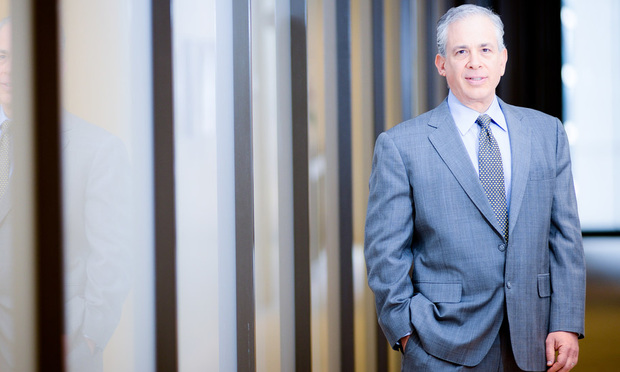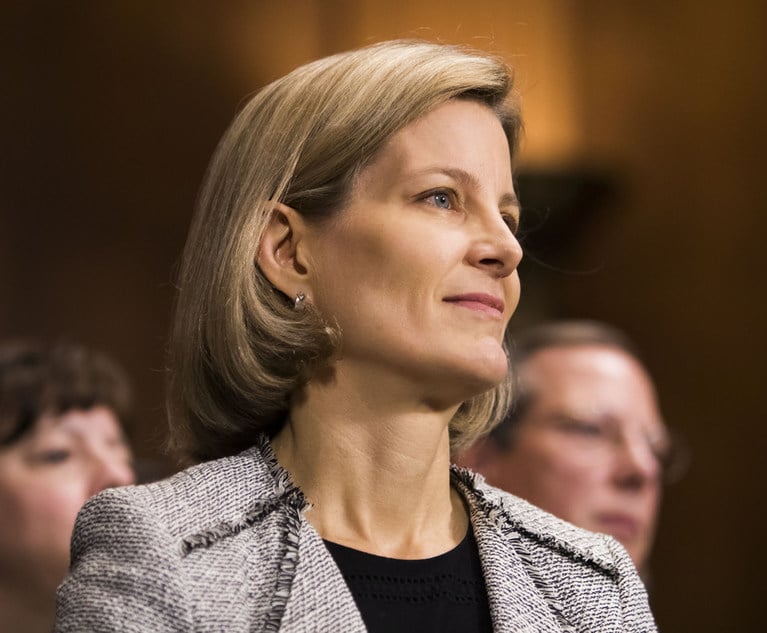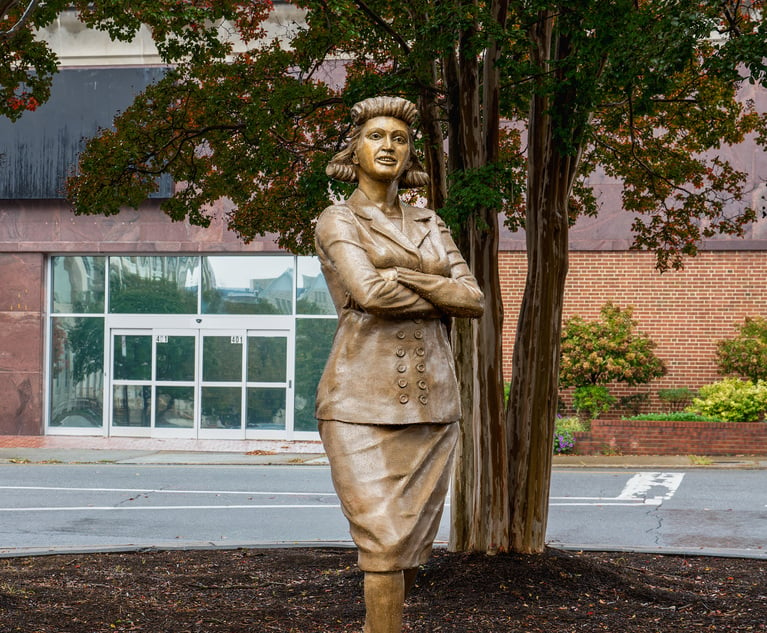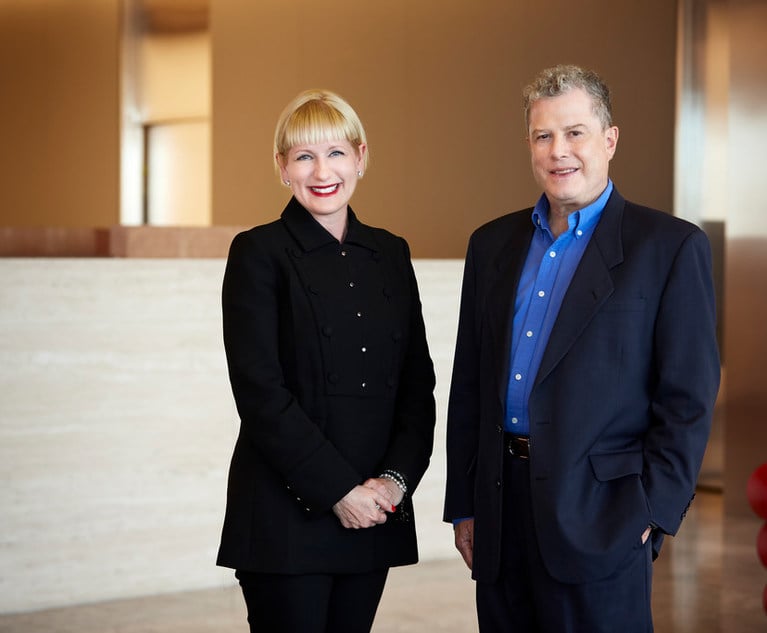Bio-Rad Sounds Poised to Win on Money, Lose on Injunction
The Federal Circuit sounded skeptical Friday of 10x Genomics and Orrick partner Josh Rosenkranz's claim that a Delaware jury awarded 15 times too much for infringement of Bio-Rad's droplet technology. But the court sounded reluctant to reimpose an injunction that Rosenkranz said would hinder research into diseases including COVID-19.
April 10, 2020 at 06:53 PM
5 minute read
 Joshua Rosenkranz. Credit: David Handschuh/ALM
Joshua Rosenkranz. Credit: David Handschuh/ALM
Orrick, Herrington & Sutcliffe partner E. Joshua Rosenkranz is known as "the defibrillator" for his ability to revive cases from the dead on appeal. But his latest patient may be beyond saving, based on arguments Friday before the U.S. Court of Appeals for the Federal Circuit.
Two of the three judges hearing Bio-Rad Laboratories v. 10x Genomics sounded skeptical of Rosenkranz's arguments that 10x Genomics Inc.'s ground-breaking single-cell technology doesn't infringe three Bio-Rad Laboratories Inc. patents, or that a Delaware jury's award of $24 million and a 15% royalty were beyond the pale.
But it did sound as if Rosenkranz may persuade the court to dissolve an injunction that he said threatens "vitally important" scientific research, including research into COVID-19. "These instruments needed to get an exemption from the injunction to do critically important COVID research," Rosenkranz told the panel.
10x, which is about six years old and just went public last summer, claims to have pioneered a revolution in life sciences research. Scientists around the world use its tech to study cancer cells, blood cells and the genetic underpinnings of inherited and infectious diseases. It characterizes Hercules, California-based Bio-Rad as a failed competitor that bought patents from the University of Chicago and somehow persuaded jurors to award 15%, which Rosenkranz said was 15 times the amount Chicago had actually negotiated for the patents before Bio-Rad came along.
Jurors found that the Chicago patents claimed the equivalent of 10x's technology. On Friday, Rosenkranz argued that the Chicago patents specifically claim a non-fluorinated channel in a microfluidic chip, whereas 10x redesigned its products to use a fluorine compound called Kynar. "Simply put, an opposite cannot be an equivalent," Rosenkranz told the court.
But Judge Kathleen O'Malley stopped him short, pointing out that the doctrine of equivalents case law makes an exception for "tangential" differences. "I don't see any real dispute in the record as to whether the addition of the Kynar had any technological benefit or purpose," O'Malley said.
"There was a dispute in the record, but I would grant you that the jury was entitled to conclude that the two function the same," Rosenkranz said.
"Your own witnesses said they knew of absolutely no benefit to adding it, right?" O'Malley pressed.
"Certainly the jury could have found that," Rosenkranz conceded. "But our own witnesses said that the Kynar chelates better."
"But if the jury could have found it, doesn't that really answer the question?" Judge Pauline Newman asked.
Rosenkranz pivoted to damages. "Bio-Rad's expert cherry-picked the licenses with the three highest outlier rates in the record" and didn't apportion the rates to account for 10x's sizable contributions to its technology, he said.
"I didn't see any discussion of Daubert or admissibility issues," O'Malley said.
Rosenkranz insisted that 10x has raised a proper Daubert challenge on appeal—and he got support from the third member of the panel, Judge Richard Taranto, on that point. But he seemed to put off Newman when he said the Chicago patents "had nothing to do with this enormously valuable single-cell invention."
"I think that there was some question as to whether it was completely different," said Newman, who is a chemist by training. "Let's not overstate."
Weil, Gotshal & Manges partner Edward Reines argued for Bio-Rad that 10x waited until after claim construction in the case to create its Kynar redesign, for the sole reason of getting around the doctrine of equivalents argument. "It was created in law offices, not in a laboratory," he said. "And it was designed precisely for what they called, quote-unquote, 'intellectual property reasons.'"
"So the real question is, is it a brilliant attempt to get around it?" O'Malley asked.
Reines laughed and said, "Well put, your honor," though it wasn't completely clear if O'Malley was joking.
Taranto sounded skeptical about damages, asking Reines about expert testimony describing the massive work that needed to be done from the time of the patents in the early 2000s to creating a worthwhile marketable product. "Why doesn't that point rather strongly in the direction of the percentage being rather lower than it is?" he asked.
Reines argued that 10x's 85% of the license covers that work, but that in any event, a droplet product is not like a cellphone with hundreds of features to apportion for. "We shouldn't let the cellphone cases defeat a half-billion investment in this case," Reines said.
All three of the judges sounded skittish about maintaining the injunction Bio-Rad won in district court, even though 10x has since designed around parts of it.
Newman cited "the importance of the product, the importance to the community and to the advancement of science."
"Where is the competition exactly at this point?" O'Malley asked.
Rosenkranz argued that not only does Bio-Rad not offer a competing product, "there is no other instrument developed by anyone else that does those things."
This content has been archived. It is available through our partners, LexisNexis® and Bloomberg Law.
To view this content, please continue to their sites.
Not a Lexis Subscriber?
Subscribe Now
Not a Bloomberg Law Subscriber?
Subscribe Now
NOT FOR REPRINT
© 2025 ALM Global, LLC, All Rights Reserved. Request academic re-use from www.copyright.com. All other uses, submit a request to [email protected]. For more information visit Asset & Logo Licensing.
You Might Like
View All
'Irreparable Harm'?: US Judge Denies Big Pharma Motion to Halt FDA-Approved Generic Drug
3 minute read
'Johns Hopkins Preyed on Black Women': Ben Crump Reps Henrietta Lacks Estate
3 minute read
Several Am Law 100 Firms Help Compliance Startup SingleFile Raise $6.5M

Jenner, Looking at 'Stretch' Goals, Reached Double-Digit Revenue and Profit Growth
5 minute readLaw Firms Mentioned
Trending Stories
- 1Reviewing Judge Merchan's Unconditional Discharge
- 2With New Civil Jury Selection Rule, Litigants Should Carefully Weigh Waiver Risks
- 3Young Lawyers Become Old(er) Lawyers
- 4Caught In the In Between: A Legal Roadmap for the Sandwich Generation
- 5Top 10 Developments, Lessons, and Reminders of 2024
Who Got The Work
J. Brugh Lower of Gibbons has entered an appearance for industrial equipment supplier Devco Corporation in a pending trademark infringement lawsuit. The suit, accusing the defendant of selling knock-off Graco products, was filed Dec. 18 in New Jersey District Court by Rivkin Radler on behalf of Graco Inc. and Graco Minnesota. The case, assigned to U.S. District Judge Zahid N. Quraishi, is 3:24-cv-11294, Graco Inc. et al v. Devco Corporation.
Who Got The Work
Rebecca Maller-Stein and Kent A. Yalowitz of Arnold & Porter Kaye Scholer have entered their appearances for Hanaco Venture Capital and its executives, Lior Prosor and David Frankel, in a pending securities lawsuit. The action, filed on Dec. 24 in New York Southern District Court by Zell, Aron & Co. on behalf of Goldeneye Advisors, accuses the defendants of negligently and fraudulently managing the plaintiff's $1 million investment. The case, assigned to U.S. District Judge Vernon S. Broderick, is 1:24-cv-09918, Goldeneye Advisors, LLC v. Hanaco Venture Capital, Ltd. et al.
Who Got The Work
Attorneys from A&O Shearman has stepped in as defense counsel for Toronto-Dominion Bank and other defendants in a pending securities class action. The suit, filed Dec. 11 in New York Southern District Court by Bleichmar Fonti & Auld, accuses the defendants of concealing the bank's 'pervasive' deficiencies in regards to its compliance with the Bank Secrecy Act and the quality of its anti-money laundering controls. The case, assigned to U.S. District Judge Arun Subramanian, is 1:24-cv-09445, Gonzalez v. The Toronto-Dominion Bank et al.
Who Got The Work
Crown Castle International, a Pennsylvania company providing shared communications infrastructure, has turned to Luke D. Wolf of Gordon Rees Scully Mansukhani to fend off a pending breach-of-contract lawsuit. The court action, filed Nov. 25 in Michigan Eastern District Court by Hooper Hathaway PC on behalf of The Town Residences LLC, accuses Crown Castle of failing to transfer approximately $30,000 in utility payments from T-Mobile in breach of a roof-top lease and assignment agreement. The case, assigned to U.S. District Judge Susan K. Declercq, is 2:24-cv-13131, The Town Residences LLC v. T-Mobile US, Inc. et al.
Who Got The Work
Wilfred P. Coronato and Daniel M. Schwartz of McCarter & English have stepped in as defense counsel to Electrolux Home Products Inc. in a pending product liability lawsuit. The court action, filed Nov. 26 in New York Eastern District Court by Poulos Lopiccolo PC and Nagel Rice LLP on behalf of David Stern, alleges that the defendant's refrigerators’ drawers and shelving repeatedly break and fall apart within months after purchase. The case, assigned to U.S. District Judge Joan M. Azrack, is 2:24-cv-08204, Stern v. Electrolux Home Products, Inc.
Featured Firms
Law Offices of Gary Martin Hays & Associates, P.C.
(470) 294-1674
Law Offices of Mark E. Salomone
(857) 444-6468
Smith & Hassler
(713) 739-1250










